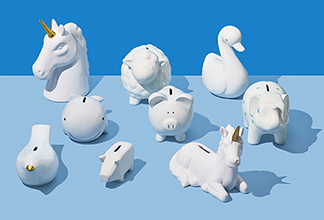Practice Accounts: Frequently Asked Questions
Published on September 1, 2020
minute read
Share:
How Do I Access My Practice Accounts?
- RBC Direct Investing clients: Access your Practice Accounts from the Home menu
- RBC Online Banking clients: Log in to RBC Online Banking. From the Accounts Summary tab, under Investments, select “RBC Direct Investing Practice Account” to access the RBC Direct Investing site
How Do I Know I’m Using a Practice Account?
You will know that you are in practice mode because:
- The colour scheme of the page will change from grey to tan
- The account number shown in the drop-down menu starts with PRAC
- A warning message will appear alerting you that you’re in “practice” mode and you will see a book icon
How Are Margins Calculated in a Practice Account?
The margin calculation is a simplified process where rates are applied based on groupings:
Equities
- $5.00 and over 50%
- $3.00 - $4.99 25%
- $2.99 and under 0%
Rights & Warrants
- $5.00 and over 50%
- $3.00 - $4.99 25%
- $2.99 and under 0%
Mutual funds
- $3.00 and over 50%
- $2.99 and under 0%
Labour Sponsored Investment Funds (LSIF)
All 0%
Fixed income
All 80%
Cash
All 100%
Are Trade Execution Times for Practice Accounts Similar to Those for Actual Accounts?
The intention is to provide an experience similar to that of real accounts but delays may occur as a result of capacity issues. Trades will execute only if the daily quantity traded is not equal to $0. If you do not qualify for real-time quotes, the trades will be filled from approximately 9:45 a.m. ET to 4:15 p.m. ET to allow for the delay in quotes.
After an Investment Order Has Been Filled, When Will I See the Securities in My Account?
- Stocks – same day the order was filled
- Options – same day the order was filled
- Mutual Funds – can take up to the order's settlement date
- Fixed Income – can take up to the order's settlement date
How Do I Increase/Decrease the Cash Balance in My Practice Account?
Select “Transfer Funds” to transfer cash to and from your Practice Account. You will notice a “Practice bank account” in the “From account” drop-down menu to allow you to transfer funds without using real money.
How Can I Change the Quantity of My Holdings in My Practice Account?
From the Person icon, select “View Profile & Account Settings.” Next, select “Edit a Practice Account’” from the “Practice Account Preferences” section at the bottom of the page. Choose the account you want to edit and change the quantity of the security you’d like to alter. (Note: Practice Accounts don’t update automatically to reflect stock splits, so this option allows you to update quantities manually.)
How Do I Close My Practice Account?
Go to the Person icon > View Profile & Account Settings > Practice Account Preferences > Delete Practice Accounts. If you do not have a real RBC Direct Investing account and you only hold one Practice Account, you will have to contact us directly via Secure Message Centre or by calling 1-800-769-2560 to have your profile closed. Alternatively, the account will automatically close if you do not access the Practice Account after nine months.
Will My Practice Account Ever Be Restricted?
There are occasional days when trading volumes are especially high. To ensure that clients can execute “real” trades without interruption, Practice Accounts may be temporarily disabled.
Read More
Sharpen Your Investing Skills with a Practice Account
What Transactions Can I Perform in My Practice Accounts?
RBC Direct Investing Inc. and Royal Bank of Canada are separate corporate entities which are affiliated. RBC Direct Investing Inc. is a wholly owned subsidiary of Royal Bank of Canada and is a Member of the Canadian Investment Regulatory Organization and the Canadian Investor Protection Fund. Royal Bank of Canada and certain of its issuers are related to RBC Direct Investing Inc. RBC Direct Investing Inc. does not provide investment advice or recommendations regarding the purchase or sale of any securities. Investors are responsible for their own investment decisions. RBC Direct Investing is a business name used by RBC Direct Investing Inc. ® / ™ Trademark(s) of Royal Bank of Canada. RBC and Royal Bank are registered trademarks of Royal Bank of Canada. Used under licence.
© Royal Bank of Canada 2025.
Any information, opinions or views provided in this document, including hyperlinks to the RBC Direct Investing Inc. website or the websites of its affiliates or third parties, are for your general information only, and are not intended to provide legal, investment, financial, accounting, tax or other professional advice. While information presented is believed to be factual and current, its accuracy is not guaranteed and it should not be regarded as a complete analysis of the subjects discussed. All expressions of opinion reflect the judgment of the author(s) as of the date of publication and are subject to change. No endorsement of any third parties or their advice, opinions, information, products or services is expressly given or implied by RBC Direct Investing Inc. or its affiliates. You should consult with your advisor before taking any action based upon the information contained in this document.
Furthermore, the products, services and securities referred to in this publication are only available in Canada and other jurisdictions where they may be legally offered for sale. Information available on the RBC Direct Investing website is intended for access by residents of Canada only, and should not be accessed from any jurisdiction outside Canada.
Inspired Investor brings you personal stories, timely information and expert insights to empower your investment decisions. Visit About Us to find out more.










